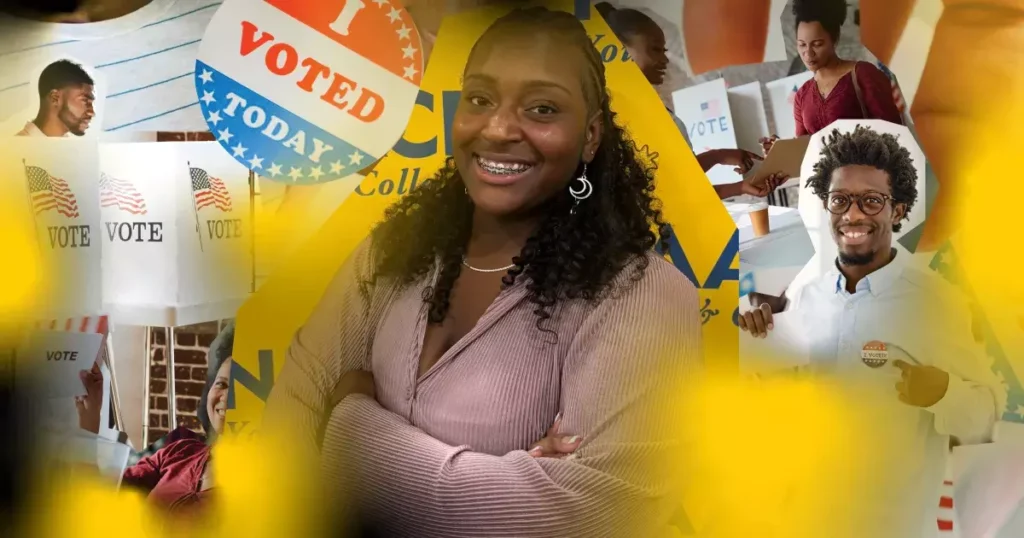Nija Whiten
I remember the excitement of voting for the first time in the 2020 election. At 19, I was finally old enough to vote for president, but the stakes felt incredibly high. With President Joe Biden and former President Donald Trump on the ballot, it was clear that this election would shape the direction of the country for years to come. Although the voting process felt as simple as filling in a few bubbles and submitting a ballot, it came with a deep sense of responsibility. This was my chance to make my voice heard and contribute to the future I wanted for my community.
When I voted for the first time, I was shocked by the power a single vote can have. It wasn’t just about choosing a president. I was voting on policies that impact health care, education, racial justice, and climate change—issues that directly impact young people like me. My vote didn’t change everything, but it was part of a collective force pushing the country toward progress. The 2020 election showed that young people can make a real impact when they come together.
As we approach the 2024 election, I am even more excited about the power of young people to shape our political landscape. I feel like this election is just as important, if not more important, than the last. Young voters have an opportunity to build on the momentum of 2020 and push for lasting change. What excites me most about seeing first-time voters participate in this election is the fresh energy they bring. Every election matters, and young people’s involvement is essential to strengthening democracy.
When I voted for the first time, I was shocked by the amount of power a single vote can have.
Young people should vote not just because it’s our right, but because the policies being debated today will shape the world we live in tomorrow. As young voters, we have the opportunity to influence decisions on issues that will affect our future, like climate change, student debt, and police reform. Remaining silent can have serious consequences. If we are not present, we are leaving those decisions to others who may not understand our struggles or share our priorities.
Every election matters, and young people’s involvement is essential to strengthening democracy.
One of the most important lessons I’ve learned since my first election is the power of local and state elections. Many young voters think the presidential election is the only thing that matters, but that is far from the truth. Local elections often have a more direct impact on our daily lives, from decisions about public education to housing policy to criminal justice reform. By voting in every election, young people can shape their communities and ensure local leaders are held accountable.
The issues that matter most to young voters in this election reflect the urgency of the moment.
Climate change continues to be at the top of the list, as younger generations face the brunt of its effects. Affordable health care and mental health resources are also important, especially as the pandemic has highlighted disparities in health care access. Student debt remains a pressing issue, with many young people struggling to gain financial footing due to overwhelming loan burdens. And of course, racial justice and police reform are still on our minds, especially in communities of color.
But understanding the problem is not enough. Young voters need to be actively involved and demonstrate a willingness to take action. One of the best ways to engage young people is through education and support on the platforms they already use. For example, social media is a powerful tool for disseminating information quickly and effectively. By breaking down complex issues into easy-to-understand content and making voting more accessible, we can reach more young people where they are. We also found that peer-to-peer conversations were very effective. Hearing about the importance of voting from friends and classmates makes it more personal and impactful.
Another important strategy is to facilitate the voting process. Expanding access to early voting and mail-in voting options and providing clear information about polling places will help remove barriers that prevent young people from voting. Many first-time voters don’t know how to vote, and providing guidance and resources is key to increasing turnout.
After all, voting is about making our voices heard and ensuring our needs are reflected in decisions made by those in power. The youth vote can be a force for change, but only if we participate. My first voting experience was a strong reminder of that responsibility. Now, as I look to future elections, I feel even more strongly that I want to encourage other young people to step into their roles as voters. We have the power to shape our future, and it starts with going to the ballot box.
Nijah Whiten is a Democracy Fellow in Arizona who works with the NAACP to mobilize Black voters.



